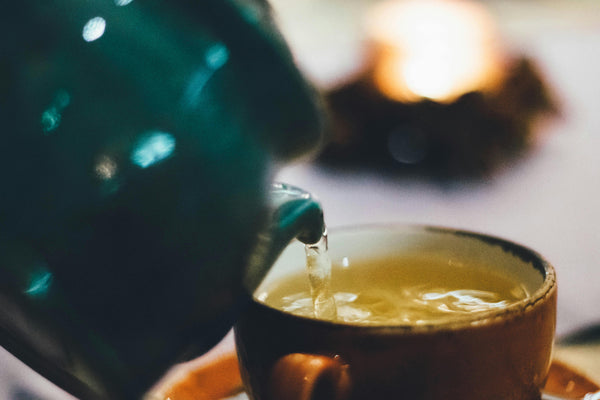There are over 11 million people working the night shift in the US alone! Night shift workers often rely on caffeine to help them stay awake at work and drinking green tea is by far the healthiest way to stay awake during a night shift.

Night shift helps the world go ‘round

People working the night shift (the work cycle that includes the hours of 12 a.m. - 5 a.m.) are a huge part of how the global economy works.
Not only do night shift workers keep the essentials like light, water, healthcare, security, communications, transportation, etc., running while the rest of us sleep, but they also help the economy by increasing profitability and allowing industries and businesses that operate in multiple time zones to stay afloat. Without these folks working late hours, the world would be a very different and much less convenient place.
Night shift and sleep

Night shift workers experience a big disruption in their circadian rhythm.
Our bodies run on a natural schedule based on light exposure, at its most basic level; when the sun comes up, we are awake, and when the sun goes down, we are asleep. The 24-hour circadian rhythm cycle that happens to each of us every day can be affected by food, stress, environmental factors like temperature, physical activity, and, most importantly, exposure to light.
Almost every living thing has a circadian rhythm - plants, animals, microorganisms, and even the organs in our bodies adhere to a rhythm.
Night shift and the biological clock
As humans, we have a master biological clock in our brains.
The clock is a grouping of nerve cells known as the suprachiasmatic nucleus (SCN). The SCN switches genes on and off in specific orders and controls the production of melatonin in our bodies. When our brain detects that it’s nighttime, our master clock produces more melatonin and makes us sleepy.
Night shift workers are exposed to light at night and forced to stay awake when their bodies want to be asleep. This misalignment in their circadian rhythm can cause a host of health-related issues and force them to fight a battle against their bodies to stay awake at work.
Green tea instead of coffee for night shift workers

While caffeine is a well-known way to stay awake and boost your energy, the type of caffeine drink you consume could either help or harm your body.
The most popular caffeine-filled drinks for night workers are coffee and energy drinks, but there’s a catch when it comes to drinking them. The added sugar, stimulants, and filler ingredients that are in energy drinks can do a host of unhealthy things to your body, including dehydrating you, being bad for your skin and hair, giving you anxiety, and causing insomnia. Coffee can give you jitters, damage your teeth and gut, and cause insomnia.
With night shift workers struggling to balance their circadian rhythm, the number one thing they should avoid is insomnia-causing stimulants like coffee and energy drinks - that’s where green tea comes in!
Green tea has caffeine to help wake you up, but it also has catechins to load your body up with antioxidants that help fight diseases, cancer, bad skin, bad breath, and soooo many other things. Green tea naturally has l-theanine to avoid caffeine jitters, help you focus, reduce stress, and improve your sleep quality!
The list of benefits of the antioxidants and amino acids in green tea could go on forever, but here are a few key ones:
- Improve sleep health
- Lower anxiety
- Help manage stress
- Slows down aging
- Help with headaches and migraines
- Help treat PCOS
- Lower your risk of getting sick
- Help you lose weight
- Boost your libido
- Manage diabetes
- Help with seasonal and dietary allergies
- Combat arthritis
Bottom line
Green tea is the best thing a night shift worker or anyone can drink to boost energy and focus while also helping your body stay healthy and balanced.
Disclaimer: These statements in this blog post have not been evaluated by the Food and Drug Administration. The information provided here is for educational purposes only and should not be considered medical advice. It's essential to consult with a qualified healthcare professional before making any dietary or lifestyle changes.
Resources:
IARC Working Group on the Identification of Carcinogenic Hazards to Humans. Night Shift Work. Lyon (FR): International Agency for Research on Cancer; 2020. (IARC Monographs on the Identification of Carcinogenic Hazards to Humans, No. 124.) 1. Exposure Data. Available from: https://www.ncbi.nlm.nih.gov/books/NBK568199/
James, S. M., Honn, K. A., Gaddameedhi, S., & Van Dongen, H. P. A. (2017). Shift Work: Disrupted Circadian Rhythms and Sleep-Implications for Health and Well-Being. Current sleep medicine reports, 3(2), 104–112. https://doi.org/10.1007/s40675-017-0071-6
National Institute of General Medical Sciences. (2020, October). Circadian Rhythms. Www.nigms.nih.gov; National Institute of General Medical Sciences. https://www.nigms.nih.gov/education/fact-sheets/Pages/circadian-rhythms.aspx






